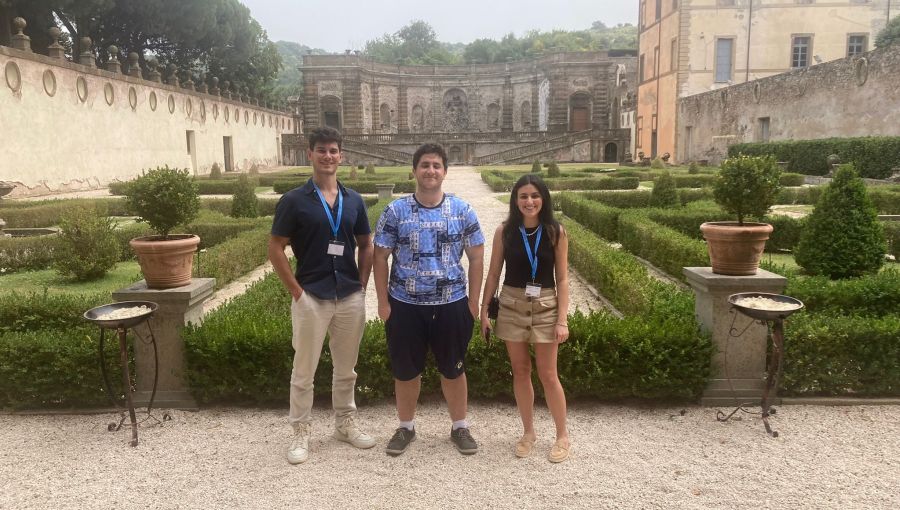Communications Alumnus Alessandro Ceschi Wins Writing Prize in China
Born in Padua, near Venice, alumnus Alessandro Ceschi graduated from JCU in 2016 with a B.A. in Communications. After graduation, Alessandro moved to China, where he has been living for eight years. He recently won first prize in the Sixth Tone China Writing Contest with his “Almost Family” piece.

Alessandro Ceschi
What made you decide to move to China?
A short trip to China as a journalist in 2014 ignited my curiosity. I wanted to better understand this fast-growing country, and especially its people. Compared to the world that I had experienced up to that point, Chinese society felt so different, and at the same time so relevant to the West. The media image that we get about China in the West tends to focus on its political system, showing us very few human stories. How do these people live, think, and dream? To answer these questions, I went on a journey that forced me to learn Mandarin and brought me to almost every corner of China — from the deserts of Inner Mongolia in the North to the southern cities of Hong Kong and Shenzhen. I worked on documentaries, feature films, and advertisements. Over the years, I started writing in Chinese, something I hadn’t thought possible when I began learning it, but that became a great way to interact with the people around me. It shows them a side of foreigners they hadn’t seen before, and they appreciate the effort to use their native language to communicate. When I first arrived in China eight years ago, I felt a strong sense of a place eager to connect with the rest of the world. Now a lot has changed: the world feels more fragmented, and the dream of a global village seems long gone. But maybe that provides the opportunity to interact across worlds an even deeper meaning — to resist prejudice, and induce acceptance by presenting yourself with simple humanity.
Tell us about your background.
I have liked writing ever since I was a child and decided I wanted to be a journalist. During my first semester at the University of Milan, I learned about the dual degree program in Communications with JCU. One of my professors encouraged me to apply so I did, and I received a scholarship. A few months later, I was on the train to Rome.
Congratulations on winning the Sixth Tone China Writing Contest with “Almost Family.” Tell us about it.
Thank you. It’s a piece about life in an old Shanghai alleyway house during the two-month lockdown in early 2022. I recounted the interactions with my downstairs neighbors, an elderly couple who lived there their whole life, and two young men who lived next door and made a living as on-call designated drivers. With the onset of lockdown, the neighborly good mornings and polite conversations on the staircase turned into an authentic caring for each other — from inquiries about the food situation to making sure everyone had enough cleaning supplies at home. At a time in which you are locked inside and deprived of social interaction, those bits of real life felt extremely precious, almost a statement of human resilience. I originally wrote this piece in Chinese, to share my feelings with those who were going through the same experience in Shanghai. It was the English adaptation that won the prize.
How did your Communications studies help you in your career?
Studying Communications helped me realize the importance of context —regardless of whether it’s to understand media texts, social behaviors, or human thoughts. Being able to shift between contexts is what allows you to communicate effectively across cultures. As I chose to live and work in a foreign environment, that mindset was the key to getting through to my counterparts in all sorts of challenging situations. I feel that the field of communications pushes you to see multiple perspectives of an issue, which is quite a rare set of skills.
What JCU professors and/or classes had the most impact on you and why?
Although I only took one of his classes, I still hold on to some of the writing techniques learned during a class taught by Professor Carlos Dews. Also, the media studies classes influenced the way I make sense of a piece of entertainment or news content. At times I think back to Professor Thomas Govero’s Public Speaking class. There’s something eternal and almost visceral about the communication concepts I learned. I remain grateful to Professor Carolina De Luca, who figuratively put a pen in my hands, and to Professor Brian Thomson, who handed me a camera — even after I had scratched a few of them.
You were an Italy Reads volunteer. Tell us about your experience.
Italy Reads is the hidden gem of JCU. It has the purpose of trying to connect with Italian society at a local level. It’s a program that makes literature accessible and fun. It stimulates active interaction with culture, which in the Italian context is often seen as something you’re only receiving passively. During my time as an Italy Reads volunteer, I felt the enthusiasm on both sides — from JCU students and the program’s coordinator Gina Spinelli, and from the Italian students who feel like they get the chance to entertain some special guests. It’s a meaningful experience that I’m sure will impact some of those students’ life choices.
What are your plans for the future?
As they say in Chinese, my current mindset is to “take a step and look around before taking the next.” At a moment of such uncertainty, it’s become all but impossible to make long-term plans. I focus on the task at hand and trust that it will lead to an interesting place. I have different writing projects going on, mostly in Chinese, and possibly a new film script ready soon.





